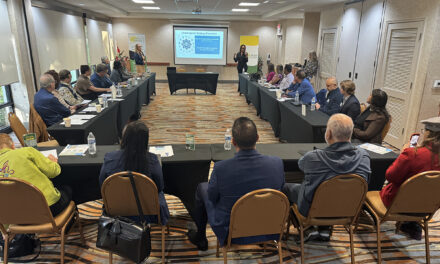Gimenez wonders if tax cuts should be larger
August 3, 2007
 County Commissioner Carlos A. Gimenez, center, spoke at the recent Chamber South breakfast. With him, from left, Bob Gallaher, Gallaher & Birch, chamber chair-elect; Phillis Oeters, Baptist Health South Florida; Peter Jude, Kendall Regional Medical Center; and Mary Scott Russell, president of the chamber. |
Miami-Dade County Commissioner Carlos A. Gimenez surprised a lot of us at the recent Chamber South breakfast by saying that the state-imposed tax cuts are not only reasonable, but probably don’t go far enough.
Some of us expected him to say that the tax cuts would create chaos and cause problems with many county services, and we were prepared to challenge that. But he took the fun out of it by telling us what we already knew – that the county was not cautious with our tax dollars during those years when property values were skyrocketing, and the current slump in the housing market is caused, at least in part, by irresponsible financial management by the county and (although he didn’t point the finger) by the school board and municipal governments.
“People are leaving Miami who I thought would be here forever,” he told the Chamber South audience at the Dadeland Marriott. “The younger generation cannot afford to buy a house. Taxes and insurance are so high, they can’t afford a mortgage payment on top of that.”
During all those years of rising property values, the County Commission held the line on the tax rate, but that tax rate was being applied to an ever-enlarging tax base as property values increased. Instead of looking at the dollars being collected and saying: “Let’s live on 3% more than last year, and adjust the tax rate down accordingly,” the county collected hundreds of millions in extra income as the tax base rose in double-digit numbers.
If you are protected by the Save Our Homes amendment, your taxes increased by no more than 3% a year. But when you try to sell your house, the next buyer will pay tax on the true value of the property, and may end up paying two or three times the taxes that you’ve been paying. If you do not have the Save Our Homes protection, if you have commercial or rental property, “your taxes have gone through the roof,” Gimenez said.
The county isn’t alone in this, of course. The school board and most municipalities are equally guilty. “Government will spend every penny it can get its hands on,” the Commissioner told the audience.
Gimenez also said that the actual amount of the budget cut faced by the county is a slippery number, depending on how it’s calculated. He said original estimates of $300 to $450 million were based on assumptions that the tax base would grow 15% and the tax rate would remain the same. In fact, he said, the actual reduction is only about $87 million out of a $2.3 billion budget.
He said that he has started to review the new proposed county budget, and so far he has not seen much in the way of cuts. “Homeowners will be disappointed when they see how little they save in taxes,” he told the Chamber. “The owner of a home valued at $250,000 in unincorporated Miami-Dade County will see a reduction of about $350 a year in county taxes. A $500,000 home will save $600 to $700.”
Gimenez said the County Commission needs to take a hard look at spending and how services can be delivered in a more efficient manner. “I have to wonder why we have more county employees now than before all the incorporations began,” he said. “We have so many new municipalities, all collecting their own taxes and taking over services that used to be provided by the county. You would think we would have significantly fewer county employees as a result.”
As nice as it was to hear Gimenez say all of this, the truth is that the crisis developed on his watch, and you have to be unhappy that he and the other commissioners did not see this coming. So let’s see what happens next. Will Gimenez take the lead to cut taxes further? What will the other commissioners do?
Gimenez also talked about the constitutional amendment that will be on the ballot in January to amend the Save Our Homes protection. If it passes, homeowners would have the choice of keeping their Save Our Homes status, or trading it for a much larger homestead exemption, which could significantly lower taxes. The typical home would have a homestead exemption of about $195,000 instead of the current $25,000, he said. So a $500,000 house would be taxed on $305,000 instead of $475,000. People who bought in recent years could find themselves with a much lower tax bill, and – in theory — it would make Save Our Homes properties easier to sell.
The Commissioner predicted that the amendment would fail. “Too complicated,” he said. “I think the Legislature will have to come back with something less complex.” But if it does pass, he said, he personally would keep the Save Our Homes protection on his house.




